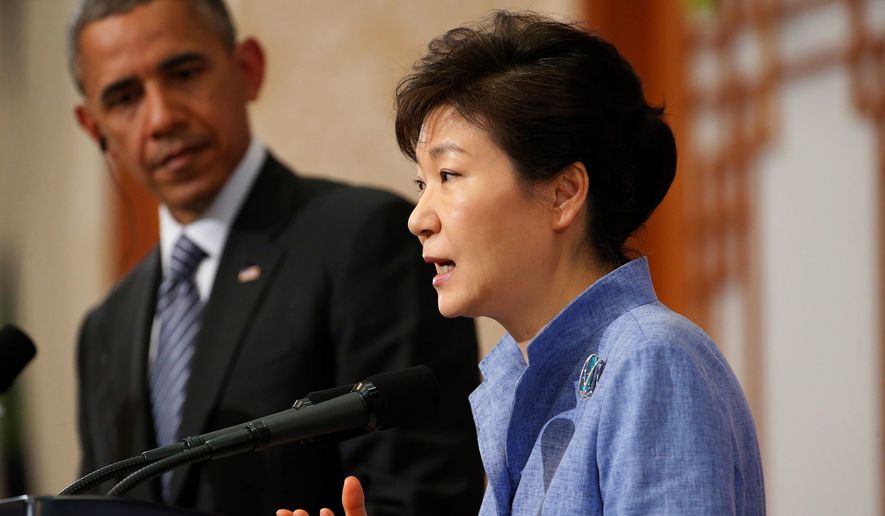The Committee for Human Rights in North Korea (HRNK) warmly welcomes Republic of Korea President Park Geun-hye to Washington, D.C., and commends Her Excellency’s vision and efforts toward a peaceful, prosperous, democratic and unified Korean Peninsula. The only U.S.-based bipartisan independent NGO tasked to investigate and report on North Korea’s human rights situation, our committee looks forward to President Park’s continued involvement in bringing freedom, justice and economic development to the people of North Korea.
Six decades ago, the Republic of Korea was one of the world’s most destitute countries. Through the tireless efforts and sacrifice of its people, through the friendship, partnership and protection provided by the ROK-U.S. alliance, and based on a host of quintessentially Korean values, the Republic of Korea accomplished “The Miracle on the Han River.” The economic, social and political development that took other nations centuries to accomplish was achieved in the Republic of Korea in just decades. Once a recipient of international humanitarian, development and security assistance, the Republic of Korea has become a provider of such assistance to countries in the developing world today.
In the Republic of Korea, 50 million people benefit from freedom, prosperity and opportunity. North of the 160-mile-long, 2.5-mile-wide DMZ, one of the world’s most heavily militarized borders, 25 million fellow Koreans have been precluded by their own government from seeking the freedom to improve their lives. A quarter-century after the collapse of communist dictatorships in the former Soviet Union and in Eastern Europe, the Kim family regime in North Korea has not only survived, but also succeeded in undertaking two hereditary transmissions of power, from grandfather Kim Il Sung to father Kim Jong Il in July 1994, and to grandson Kim Jong Un in December 2011.
Despite some positive changes brought about by informal bottom-up marketization developed as a survival mechanism, North Koreans continue to be methodically indoctrinated, closely monitored, thoroughly isolated and perpetually repressed. In the 21st century, North Korea is the only country on the planet that strictly classifies its population into categories and subcategories, pursuant to “songbun,” a loyalty-based system of social discrimination. Today, North Korea is the only country on Earth that is still running a political prison camp system. As many as 120,000 prisoners, oftentimes members of three generations of the same family, are currently detained inside North Korea’s vast system of unlawful imprisonment.
Our committee was the first organization to use satellite imagery, corroborated with testimony by former inmates and guards, to concentrate international attention on North Korea’s political prison camps. The committee was the group that first recommended that the U.N. Security Council address North Korea’s human rights violations. In March 2013, the 47 member states of the U.N. Human Rights Council passed by consensus a resolution to establish a U.N. Commission of Inquiry on the situation of human rights in North Korea (U.N. COI). Following a yearlong meticulous investigation, the commission determined that crimes against humanity continue to be committed in North Korea pursuant to policies established at the highest level of the state. The commission’s report recommended that the U.N. Security Council refer the North Korean human rights situation to the International Criminal Court (ICC). The report changed fundamental perceptions of North Korea: Once seen as a bizarre remnant of the Cold War, North Korea is now understood as a human rights wasteland, where fundamental rights are denied and atrocities committed.
Keen on its own survival, North Korea’s Kim regime invested heavily in its nuclear weapons, long-range ballistic missiles, jet fighters and other weapons, while hundreds of thousands, if not millions, of its people starved to death or fell victim to malnutrition-induced disease. The North Korea sanctions regime grounded in U.N. Security Council Resolutions 1718, 1874, 2087 and 2094 aims to prevent the development and proliferation of nuclear and missile technology by North Korea. Regrettably, that sanctions regime fails to address any of the grave human rights concerns.
Nonetheless, the U.N. COI report created significant momentum, resulting in resolutions of the U.N. Human Rights Council and U.N. General Assembly in 2014. In December 2014, North Korean human rights was included in the U.N. Security Council’s permanent agenda. Previously overshadowed by nukes and missiles, human rights would easily disappear off the radar screen of the international community. Now human rights is here to stay.
What is needed in order to bring freedom and human rights to the people of North Korea is an international grass-roots campaign on a par with action taken to bring down South Africa’s apartheid in the 1980s. In Washington, D.C., the U.S. Congress must seek creative ways to implement an effective and targeted sanctions regime, and to collaborate with the legislative branches of like-minded democracies, including the Republic of Korea, for that purpose. In Seoul, the long-overdue passage of the North Korean Human Rights Act through the National Assembly would generate critical resources needed to seek accountability, but also meaningful human rights and humanitarian engagement with North Korea. By hosting the U.N. Human Rights Office in Seoul, the government of the Republic of Korea is implementing an essential recommendation of the U.N. COI. Our committee calls on Her Excellency President Park to further support our efforts on the international scene by encouraging North Korea to engage through available human rights mechanisms, including the Office of the High Commissioner for Human Rights and the U.N. Special Rapporteur on the human rights situation in North Korea.
• Katrina Lantos Swett is HRNK co-chair and president and CEO of Lantos Foundation for Human Rights and Justice. Gordon Flake is co-chair of the Committee for Human Rights in North Korea and CEO, Perth USAsia Centre, The University of Western Australia. Greg Scarlatoiu is HRNK’s executive director.




Please read our comment policy before commenting.